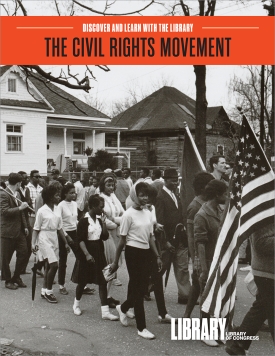Primary tabs
You don't need to be an ALA Member to purchase from the ALA Store, but you'll be asked to create an online account/profile during checkout to proceed. This Web Account is for both Members and non-Members. Note that your ALA Member discount will be applied at the final step of the checkout process.
If you are Tax-Exempt, please verify that your account is currently set up as exempt before placing your order, as our new fulfillment center will need current documentation. Learn how to verify here.
- Description
- Table of Contents
- About the author
- Reviews
Foreword by Carla Hayden, Librarian of Congress
The inaugural publication in “Discover and Learn with the Library,” an educational series published by the Library of Congress in association with the American Library Association, The Civil Rights Movement explores this important topic through classroom-ready materials for teachers, librarians, and home educators working with grades 6–12. Designed to support state curricula and teaching standards, this full-color book combines facsimiles of primary sources from the Library’s unparalleled collections with source citations, information about the sources’ origins, teaching strategies, and guides to additional online resources. Offering a convenient way to integrate primary source material into classrooms and libraries, The Civil Rights Movement
- features perforated pages on each primary source for ease of sharing;
- includes material that highlights the era’s most frequently taught milestones: Rosa Parks’s arrest and the Montgomery Bus Boycott, Brown v. Board of Education, school desegregation in Little Rock, the Birmingham campaign, the March on Washington, the Selma civil rights marches, and the Civil Rights Act of 1964 and Voting Rights Act of 1965;
- reframes research as an engaging process that feeds curiosity, creativity, and change;
- prepares students for the future by developing their critical thinking skills; and
- provides a background essay, an in-depth usage guide, and a variety of teaching ideas and other tools for educators.
Readers interested in Professional Review Copies or LIS Instructor Desk Copies may email editionsmarketing@ala.org to request a PDF galley of the text; we cannot provide print copies.
Foreword
Carla Hayden, Librarian of Congress
Discover and Learn: The Power of Primary Sources
How to Use This Resource
Background: The Civil Rights Movement
Primary Source Discovery Pages
Brown v. Board of Education
- Segregation in District of Columbia Schools, 1899
- Strategy to Attack School Segregation
- Supreme Court Strikes Down School Segregation
Rosa Parks and the Montgomery Bus Boycott
- Rosa Parks Describes Her Arrest
- Instructions for Participants in the Montgomery Bus Boycott
- Rosa Parks’s Poll Tax Receipt
The Little Rock Nine and School Desegregation
- A Governor Tries to Block School Integration
- Reporting on the Little Rock Integration Crisis
- A Rally Against School Integration
Letter from Birmingham Jail
- Writing a Legendary Letter
The March on Washington
- A Veteran Organizer Plans the March
- A Manual for Marchers
- Newspapers Across the Nation Respond to the March
The Civil Rights Act of 1964
- Civil Rights Leaders Meet with Members of Congress
- Opponents to the Civil Rights Act Make Their Case
- Congress Passes the Civil Rights Act of 1964
The Selma-to-Montgomery Marches
- Selma Two Years Before the Marches
- An Activist Recalls Organizing in Selma
- Marching from Selma
The Voting Rights Act of 1965
- Selma Marches Spur Action
- Barriers to Registering Voters
- How Will the Voting Rights Act Work?
Remembering and Continuing
- Memorial in Montgomery
- A Final Message from a Legend
Transcripts: Rosa Parks’s Manuscripts
More to Discover
Teacher’s Guides
- Analyzing Books and Other Printed Texts
- Analyzing Manuscripts
- Analyzing Maps
- Analyzing Newspapers
- Analyzing Oral Histories
- Analyzing Photographs and Prints
- Analyzing Primary Sources
Primary Source Analysis Tool
Primary Sources Cited
Index
Library of Congress
The Library of Congress is the largest library in the world, with millions of books, films and video, audio recordings, photographs, newspapers, maps, and manuscripts in its collections. The Library is the main research arm of the US Congress and the home of the US Copyright Office. Explore collections, reference services and other programs and plan a visit at loc.gov; access the official site for U.S. federal legislative information at congress.gov; and register creative works of authorship at copyright.gov.
Have you read this book? Leave a review!



